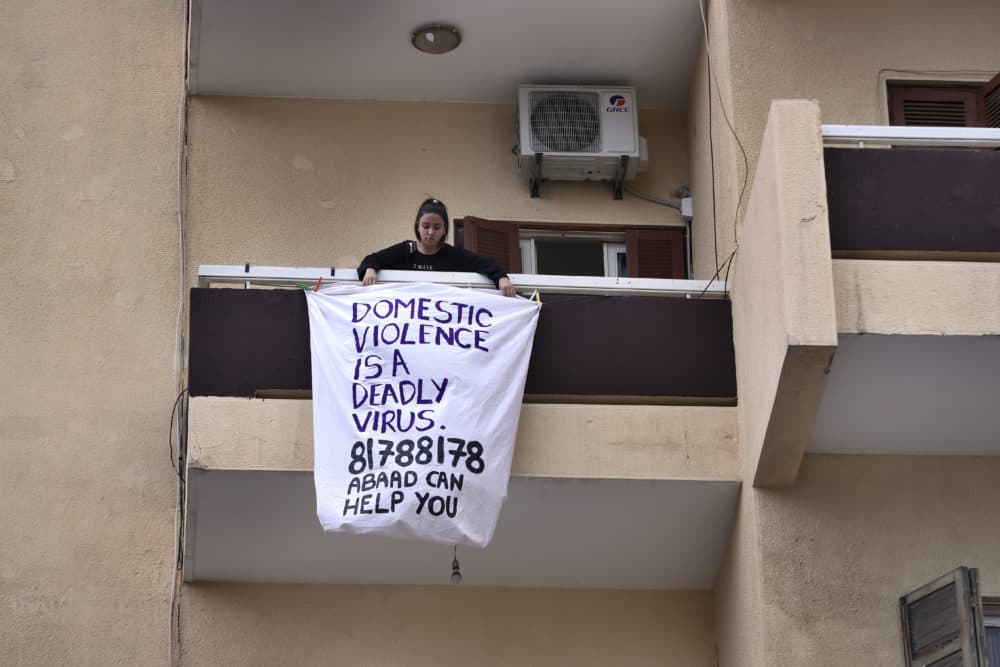Advertisement
Commentary
12 Million People A Year Are Abused By Their Partners. The Pandemic Is Making That Much Worse

My mother died by suicide when I was just 4 years old; 40 years later, I discovered her diary. There I found deeply disturbing descriptions of physical intimidation and emotional abuse from my father. This stunning discovery shed light on my mother’s fierce battle with depression, my parents’ divorce and my mother’s tragic death.
At that time, the U.S. knew nothing of restraining orders (limited protection as they are, even now). Nor did we have today’s court guidelines, outreach and overall sensitivity when it comes to intimate partner violence. We also didn’t have a pandemic.
Decades after my mother’s battle with intimate partner violence, I’m newly disturbed by the surge of intimate partner violence during the COVID-19 crisis. With staggering unemployment numbers, families sequestered in their homes and physical distancing measures interrupting social networks, intimate partner violence is putting more people at risk than ever.
On average, the National Domestic Violence Hotline gets about 12,750 contacts per week. In April, however, “We experienced a 12% increase and anticipate a more significant spike to come,” Christina So, the hotline’s communications director told me.
As a child psychiatrist, I am acutely aware of the children in these homes who get caught in the crossfire. For more than 25 years, I’ve worked with children who have witnessed abuse and violence at home. Robust research shows that these children are at increased risk of depression, suicide attempts, aggression and substance abuse. These are kids who — under normal circumstances — would have at least some time away from family violence and who might be able to seek help through teachers and other trustworthy adults at their schools. Those of us (and looking back, I now include myself among these kids) who make it to the other side, typically do so because of these caring adults outside of the home.
It is a very dangerous time for women. Men are socialized to view women as property, objects, and as having less value than men … I think the pandemic amplifies everything
Ted Bunch
I wanted to understand more about intimate partner violence in this time of COVID-19, so I spoke to a roster of thought leaders and professionals, beginning with psychotherapist Carol A. Lambert, author of “Women with Controlling Partners.”
We know that abusers often trap their partners with threats, gaslighting and other tactics of emotional control. In public health crisis like the one we’re living through now, where access to friends, family and other safety nets may be limited, Lambert told me that “isolation deprives people of support and makes the survivor more dependent on her partner.” Isolation weakens a survivor’s ability to resist. This coupled with what she calls “rituals of compliance” — housekeeping, cooking and even controlling the details of homeschooling activities — can be corrosive to a survivor’s inner spirit.
Survivors are even less likely to leave their abusers if unemployment has stripped them of income. The threat of contracting coronavirus in a shelter only adds to the risk of escape.
Advertisement
The situation is dire. So, what’s to be done?
Family therapist and leadership advisor Ken Dolan-Del Vecchio suggests that one solution may sit with men. He says men have an important role to play in ending intimate partner violence, due to the unfortunate reality that most men listen more respectfully to other men, than anybody else.
[M]en have an important role to play in ending intimate partner violence, due to the unfortunate reality that most men listen more respectfully to other men, than anybody else.
“There is a worldwide pandemic of violence against women, and it’s always going on,” said Dolan-Del Vecchio, author of “Making Love, Playing Power: Men, Women, and the Rewards of Intimate Justice.”
He encourages men to be mindful of how prevalent intimate partner violence is -- 12 million women and men over the course of a year, per the National Domestic Violence Hotline -- and to watch for indicators of abuse on Zoom, FaceTime or even the telephone.
“We should be incredibly vigilant and challenge one another,” said Dolan-Del Vecchio. “We should say things like, ‘I’ve heard you talk about your wife as though she can't ever get anything right or she needs to be supervised like she’s not a competent adult, and I worry about that. I don't like it. I'd like to talk to you about that.’”
Ted Bunch, co-founder of A CALL TO MEN, a nonprofit dedicated to educating men on healthy and respectful manhood, agrees:
It is a very dangerous time for women. Men are socialized to view women as property, objects, and as having less value than men…I think the pandemic amplifies everything and if men and boys aren't living up to the ‘standards of manhood’ — pulling yourself up by the bootstraps and winning — then men are often shamed because of it.
When friends and neighbors and coworkers speak out against abusive behavior, they also protect vulnerable children. We have decades of research about the negative emotional and physical impact of parental tension on children. Patricia Papernow, a psychologist and author of “Surviving and Thriving in Stepfamily Relationships,” said that it’s not just aggressive conflict that impacts kids. “Even moderate tension compromises kids’ attention, academics, and immune systems.”
Usually, schools are on the front lines for helping stressed families with basic needs and access to life skills and therapeutic support. Months into the pandemic, most camps are canceled, school openings in the fall are in limbo, and I imagine our children in violent homes are especially scared, confused, and sad. But even in these circumstances, hope is possible.
Intimate partner violence is an enduring problem with a toxic twist added during the pandemic.
Lambert suggests that those with controlling partners find careful ways to resist, caring for themselves and the safety of their children while maintaining the utmost caution. She encourages survivors to take walks, and to take their phones along when they do. “Walk around the block and call your best friend, and even look up resources. Just be sure to erase internet activity and call history afterward,” she said.
“We believe that survivors are incredibly strong and resourceful, and we’re inspired by them every single day,” Christina So, of the Hotline, said.
Intimate partner violence is an enduring problem with a toxic twist added during the pandemic.
As an adult reading my mother’s diaries, court documents and interviews I came to understand how her sense of powerlessness and eventual suicide intertwined with intimate partner violence. Thankfully, we now have better resources and awareness that we may be able to halt such a devastating outcome.
I deeply mourn the damage happening in these families. I also fervently hope we can mobilize to support the tenacity, resistance and capacity to heal when families are impacted by intimate partner violence.
If you or someone you know is experiencing intimate partner violence, please call the National Domestic Violence Hotline at 1-800-799-7233 or visit thehotline.org.

